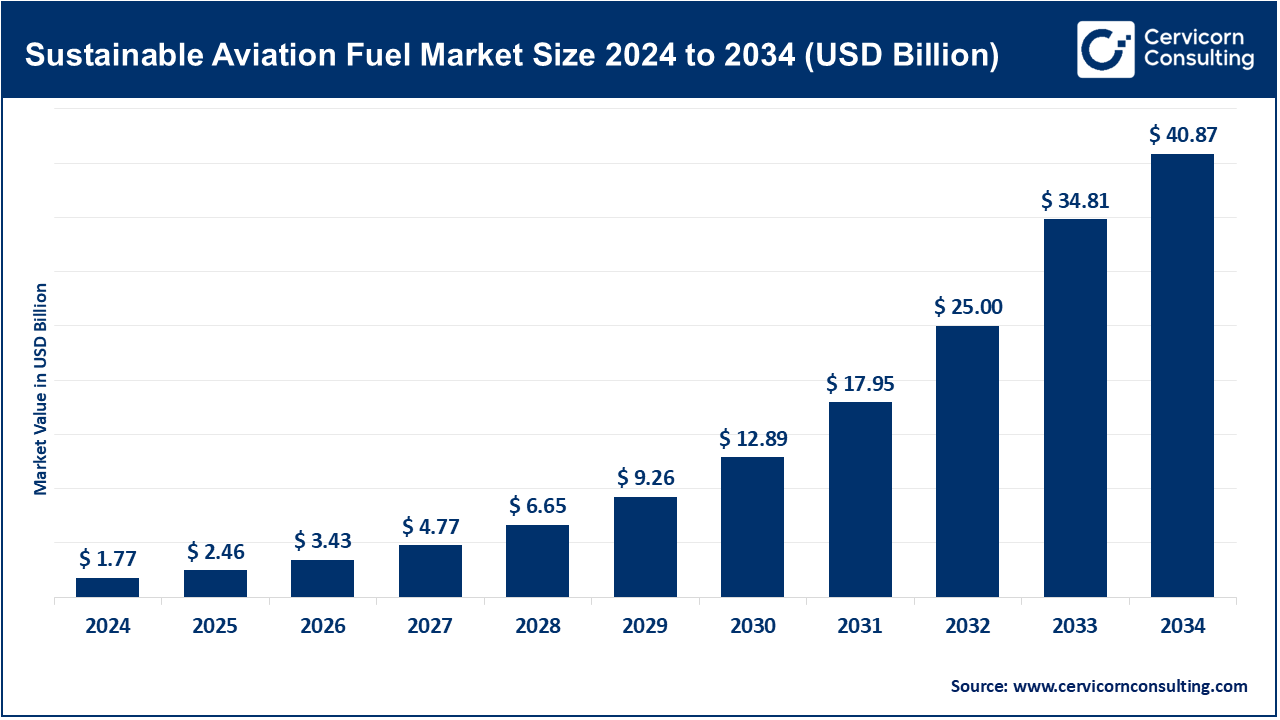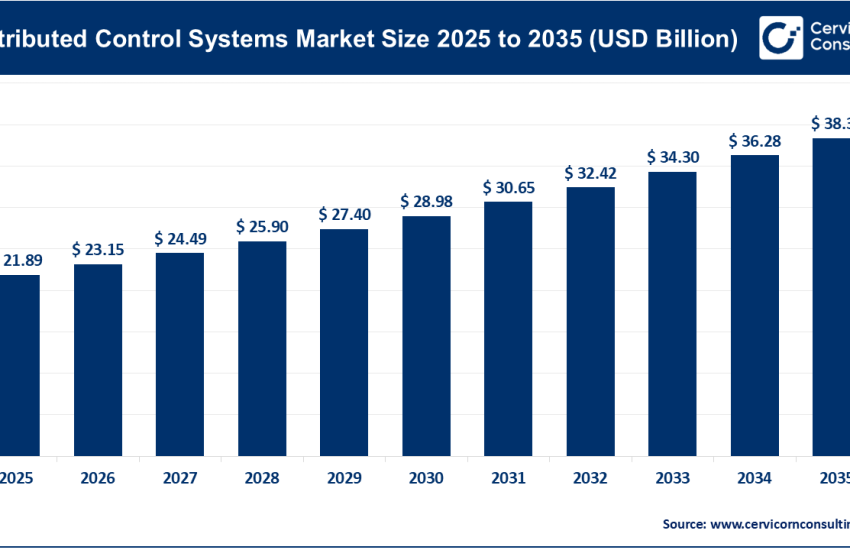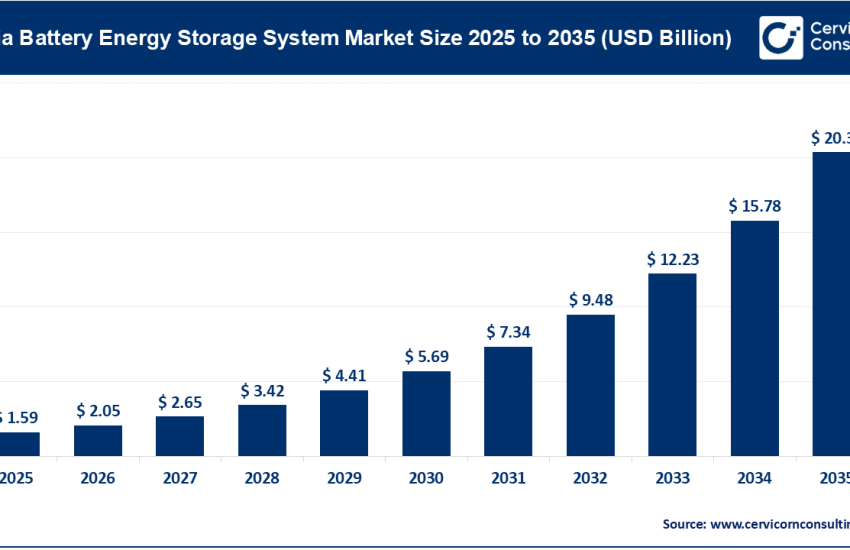Sustainable Aviation Fuel Market Growth Projections, Key Trends, and Regional Insights to 2034
Sustainable Aviation Fuel Market Growth
Several key factors drive the rapid expansion of the sustainable aviation fuel market. Regulatory mandates and government incentives play a significant role, with policies such as the EU’s Fit for 55 initiative and the U.S. Inflation Reduction Act encouraging sustainable aviation fuel production and adoption. Increasing corporate commitments to sustainability, rising consumer awareness of aviation’s environmental impact, advancements in production technology, and declining feedstock costs further bolster market growth. Additionally, airlines are actively integrating sustainable aviation fuel into their fuel mix to meet carbon offset goals and gain competitive advantages in an eco-conscious marketplace.
What is the Sustainable Aviation Fuel Market?
The Sustainable aviation fuel market revolves around the production, distribution, and adoption of alternative jet fuels derived from renewable and sustainable resources. Unlike conventional fossil-based aviation fuels, sustainable aviation fuels are made from feedstocks like used cooking oil, agricultural residues, algae, and municipal waste. These fuels are designed to significantly reduce carbon emissions while maintaining performance parity with traditional jet fuels. The sustainable aviation fuel market plays a pivotal role in transforming the aviation industry into a more sustainable and environmentally friendly sector, aligning with global climate goals and decarbonization targets.
Why is the Sustainable Aviation Fuel Market Important?
The sustainable aviation fuel market is critical for mitigating the environmental impact of aviation, a sector responsible for approximately 2-3% of global CO2 emissions. With air travel expected to continue growing, the adoption of sustainable aviation fuel is essential for reducing greenhouse gas emissions and achieving net-zero carbon targets by 2050. Beyond environmental benefits, sustainable aviation fuel development drives innovation, creates green jobs, and fosters energy security by reducing dependence on fossil fuels. Governments, international organizations, and industry leaders recognize sustainable aviation fuel as a cornerstone for sustainable development in aviation, making it a top priority in global climate strategies.
Get a Free Sample: https://www.cervicornconsulting.com/sample/2321
Sustainable Aviation Fuel Market Top Companies
- Neste Corporation
- Specialization: Renewable fuels and chemicals
- Key Focus Areas: Production of sustainable aviation fuel from waste and residues, innovative refining technologies
- Notable Features: World’s largest producer of renewable diesel and sustainable aviation fuel; extensive R&D capabilities
- 2023 Revenue (approx.): $25 billion
- Market Share (approx.): 35%
- Global Presence: Operations in over 15 countries, with major facilities in Finland, the Netherlands, and Singapore
- World Energy LLC
- Specialization: Renewable energy solutions
- Key Focus Areas: sustainable aviation fuel production, carbon management strategies
- Notable Features: One of the first commercial-scale sustainable aviation fuel producers in the U.S.; partnerships with major airlines
- 2023 Revenue (approx.): $1 billion
- Market Share (approx.): 10%
- Global Presence: Facilities in the U.S., with expansion plans targeting Europe and Asia
- LanzaTech Inc.
- Specialization: Carbon recycling technologies
- Key Focus Areas: Conversion of industrial waste gases into sustainable aviation fuel
- Notable Features: Patented gas fermentation process; partnerships with steel plants and refineries
- 2023 Revenue (approx.): $250 million
- Market Share (approx.): 5%
- Global Presence: Collaborative projects in North America, Europe, and China
- Gevo Inc.
- Specialization: Renewable chemicals and fuels
- Key Focus Areas: sustainable aviation fuel from isobutanol, sustainable agriculture practices
- Notable Features: Strong focus on carbon intensity reduction; extensive airline partnerships
- 2023 Revenue (approx.): $200 million
- Market Share (approx.): 4%
- Global Presence: Production facilities in the U.S. with distribution networks in Europe and Asia
- SABIC (Saudi Basic Industries Corporation)
- Specialization: Diversified chemicals manufacturing
- Key Focus Areas: Development of renewable feedstocks for sustainable aviation fuel
- Notable Features: Integration of advanced recycling technologies; focus on circular carbon economy
- 2023 Revenue (approx.): $50 billion
- Market Share (approx.): 3%
- Global Presence: Extensive operations in the Middle East, Asia, and Europe
Sustainable Aviation Fuel Market Leading Trends and Their Impact
- Technological Advancements: Breakthroughs in feedstock processing and refining techniques are reducing production costs and enhancing fuel efficiency. Technologies like gas fermentation and advanced bio-refining enable the use of diverse feedstocks, ensuring scalability and reliability.
- Policy and Regulation: Governments worldwide are implementing mandates for sustainable aviation fuel blending and offering tax credits and grants to incentivize production. Policies such as the Renewable Energy Directive (RED II) in Europe and the Low Carbon Fuel Standard (LCFS) in California are driving market adoption.
- Corporate Commitments: Airlines and corporations are pledging to achieve carbon neutrality by adopting sustainable aviation fuel. Notable examples include Delta Airlines’ investment in sustainable aviation fuel and Amazon Air’s partnership with producers to power logistics flights sustainably.
- Sustainable Feedstock Development: Investments in non-food feedstocks such as algae, municipal waste, and forestry residues are ensuring a sustainable and ethically sourced raw material supply for sustainable aviation fuel production.
- Global Collaboration: International partnerships, such as the Carbon Offsetting and Reduction Scheme for International Aviation (CORSIA), are aligning stakeholders to accelerate sustainable aviation fuel development and adoption.
Successful Examples of Sustainable Aviation Fuel Market Around the World
- Heathrow Airport (UK): In 2023, Heathrow achieved a milestone by integrating sustainable aviation fuel into its fuel supply, reducing emissions by 25,000 tons annually. This initiative aligns with the UK’s Jet Zero Strategy.
- Delta Airlines (USA): Delta committed $1 billion to sustainability, with sustainable aviation fuel accounting for a significant portion of its investments. The airline partnered with Gevo to secure 10 million gallons of sustainable aviation fuel annually.
- Singapore Airlines (Singapore): The airline launched the first multi-year sustainable aviation fuel pilot program in Southeast Asia in partnership with Neste and the Civil Aviation Authority of Singapore (CAAS).
- Lufthansa Group (Germany): Lufthansa has been a pioneer in sustainable aviation fuel usage, incorporating it into regular flight operations since 2011. Their 2023 initiative aims to replace 20% of jet fuel consumption with sustainable aviation fuel by 2030.
Regional Analysis: Government Initiatives and Policies Shaping the Market
North America
- Policies: The U.S. Inflation Reduction Act provides tax credits for sustainable aviation fuel producers, while California’s LCFS incentivizes blending sustainable aviation fuel with conventional fuels.
- Initiatives: Canada’s Clean Fuel Standard mandates sustainable aviation fuel blending targets, fostering domestic production and reducing reliance on imports.
- Market Outlook: High adoption rates driven by government support and strong corporate commitments.
Europe
- Policies: The EU’s Fit for 55 initiative mandates a 5% sustainable aviation fuel blending requirement by 2030, scaling up to 63% by 2050.
- Initiatives: France and Germany are investing in sustainable aviation fuel innovation hubs, while the UK’s Jet Zero Council is spearheading R&D efforts.
- Market Outlook: Europe remains a leader in sustainable aviation fuel adoption, driven by stringent climate policies and robust industry collaboration.
Asia-Pacific
- Policies: Japan’s Green Growth Strategy and India’s National Policy on Biofuels encourage sustainable aviation fuel production and adoption.
- Initiatives: Singapore’s collaboration with Neste and South Korea’s development of bio-refineries highlight regional efforts.
- Market Outlook: Rapid growth due to increasing government support and rising awareness of sustainability.
Middle East & Africa
- Policies: The UAE’s Energy Strategy 2050 and Saudi Arabia’s Vision 2030 emphasize renewable energy investments, including sustainable aviation fuel.
- Initiatives: Partnerships between global sustainable aviation fuel producers and Middle Eastern airlines drive regional adoption.
- Market Outlook: Emerging potential with strategic investments in bio-refineries and feedstock production.
Latin America
- Policies: Brazil’s RenovaBio program promotes biofuel production, including sustainable aviation fuel.
- Initiatives: Airlines like LATAM are exploring sustainable aviation fuel to reduce their carbon footprint.
- Market Outlook: Growing interest due to abundant feedstock availability and favorable climate policies.
To Get Detailed Overview, Contact Us: https://www.cervicornconsulting.com/contact-us
Read Report: Battery Energy Storage System Market Overview: Growth, Trends, and Key Players to 2033



